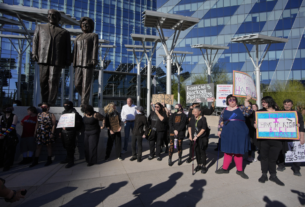The World Economic Forum (WEF) 2025 in Davos gathered government leaders, business executives, and activists to discuss global challenges and opportunities. The event focused on key issues such as economic recovery, climate change, technology, and social inequality. Greenpeace protesters disrupted the meeting, calling for more decisive action on environmental matters and drawing attention to the gaps between promises and progress.
A major topic at the forum was global economic recovery after the COVID-19 pandemic. The International Monetary Fund (IMF) projected a global growth rate of 3.1% in 2025, signaling some recovery. However, the growth is uneven across regions, with emerging markets recovering faster than developed nations such as the U.S. and Europe.
The forum also highlighted the urgency of addressing climate change. Despite efforts to combat environmental damage, activists demand more decisive actions—Greenpeace protests outside the event called for more precise, enforceable climate policies. Several world leaders pledged to meet more ambitious carbon reduction targets, but experts criticized the lack of concrete action plans and deadlines to achieve these goals.
Artificial intelligence (AI) emerged as another significant issue at the forum. Dr. Maria Green, a technology policy expert, said, “AI must be managed carefully to avoid harm.” The WEF also showcased new AI-driven technologies to improve the healthcare, transportation, and education industries.
Another focal point was technology’s role in reshaping jobs and workforce needs. Experts warned that many workers must learn new skills to remain competitive as AI and automation continue to replace some jobs. Governments and businesses must invest in education and training programs to help workers adapt. Several companies, including Google and Microsoft, announced initiatives to provide workers with digital skills and promote access to online learning.
Social inequality was a prominent topic, with discussions about how to address the growing wealth gap. Experts noted that while some countries and individuals thrive, millions remain impoverished or struggle to make ends meet. “Global cooperation is key to solving this issue,” said Carlos Rivera, a sociologist at the event.
Health issues also remained a top priority at the WEF. Experts reflected on lessons from the pandemic, focusing on improving global health systems to handle future crises. There was agreement that investing in public health is essential, particularly in addressing mental health challenges and the needs of aging populations. Experts warned that many countries are still underprepared for future health emergencies, and action is needed now to strengthen healthcare infrastructure.
Corporate responsibility was another major topic discussed during the forum. Companies were encouraged to go beyond profit-making and consider their operation’s environmental and social impacts. Business leaders were reminded that they must be accountable to the communities in which they operate. Some large corporations, including Tesla and Unilever, announced plans to reduce their carbon footprints and increase investment in sustainable practices.
Discussions included how businesses can reduce emissions and protect natural resources while growing. Several companies unveiled new green technologies, such as solar energy advancements and electric vehicles, to reduce their environmental impact. While these technologies are essential, critics argue they must be scaled up quickly to make a meaningful difference.
The WEF 2025 in Davos showed leaders committed to addressing critical global issues but highlighted the disconnect between words and actions. While some leaders made ambitious promises, experts pointed out that tangible results have yet to follow. As Dr. Green noted, “Actions must speak louder than words if we are to see real change.” The event highlighted the need for urgent action and cooperation across nations and sectors to tackle the challenges of the future.




